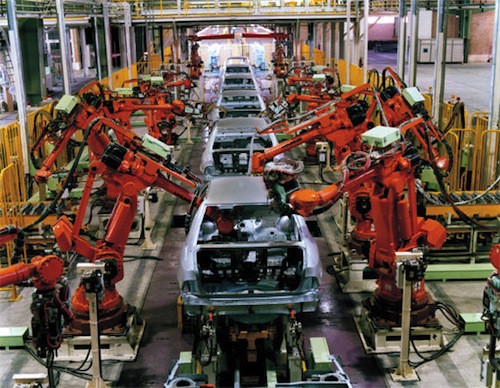


08/03/2018
Here’s a little discussion about automation and job loss that’s all too typical. Fox Business guy Stuart Varney asks a very basic question, that some companies, such as Walmart and Target, are turning to smart machines to replace humans and save money.
The robot guy gives a non-answer, purposely it seems, to distract from the important subject of lost jobs by chattering about the improved productivity and innovation. In fact, companies use automation precisely to improve productivity by ditching humans who take breaks, eat lunch and call in sick. Machines can work 24/7 and need only the occasional squirt of oil to freshen up.
FOX BUSINESS HOST STUART VARNEY: An MIT study suggests robots will create more jobs than they destroy. Bill Studebaker is with us, ROBO Global president, and a big fan of robots. Let me come back at you with this — Target and Walmart are using automation to get rid of workers on the shop floor, robots getting rid of jobs. Make the case that robots create jobs.
BILL STUDEBAKER: Well I think it is simply the case, Stuart, what you’re seeing with robots, there is a lot more collaboration going on. In the US we have the notion of fear the robots, but everywhere else in the world, it has embraced robots because robots are driving higher productivity, driving higher innovation. They’re bringing more profits, so you’re seeing this. So companies like Target and Walmart understand the need for innovation. They understand the need for better productivity …
Varney gave his inquiry another shot, saying, “it seems to me that robots get rid of a whole class of low-skilled worker,” but Studebaker wasn’t answering the job-loss question which is central to the automation revolution.
Automotive manufacturing once provided good jobs for millions of Americans, but it is mostly done by robots now.

So it’s good to listen closely when robot entrepreneurs are talking up the product.
Tech experts who don’t own robot-manufacturing companies have mostly dire predictions about the automated future workplace. Oxford researchers forecast in 2013 that nearly half of American jobs were vulnerable to machine or software replacement within 20 years. Rice University computer scientist Moshe Vardi believes that in 30 years humans will become largely obsolete, and world joblessness will reach 50 percent. The Gartner tech advising company believes that one-third of jobs will be done by machines by 2025. The consultancy firm PwC published a report last year that forecast robots could take 38 percent of US jobs by 2030. Last November the McKinsey Global Institute reported that automation “could displace up to 800 million workers — 30 percent of the global workforce — by 2030.” Forrester Research estimates that robots and artificial intelligence could eliminate nearly 25 million jobs in the United States over the next decade, but it should create nearly 15 million positions, resulting in a loss of 10 million US jobs.